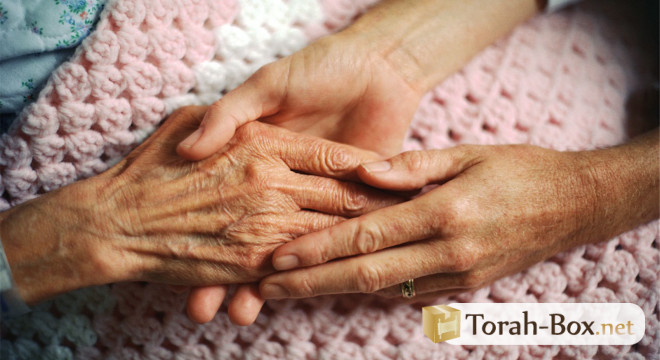
Honoring Parents
Honoring Elders
In Parashat Kedoshim, the Torah commands us to behave according to a basic tenet of Judaism: "Love your neighbor like yourself."
One of the basic expressions of loving one's neighbor is the specific mitzvah to honor elders, as quoted on Leviticus: "You shall rise before the aged and show deference to the old."
Our Sages teach that the word “zaken”, used in many Biblical passages, literally means: "Ze Shekana Chochma", he who has acquired Wisdom. The literal meaning is axiomatic, according to Rashi's commentary. But one must question why the Torah compares Seva, old age, to Zaken, an elderly Sage or Torah Scholar.
The Kli Yakar explains this passage by expounding that both the ordinary old man and the Torah scholar have acquired vast experience and knowledge of the world and that alone should inspire others to respect them. A Torah Scholar has studied the Torah in depth and reflected on its commentaries many times over. By internalizing this abundance of knowledge, he has earned unfathomable wisdom.
And an ordinary old man may have gained valuable wisdom by simply witnessing so many world events and overcoming innumerable challenges throughout his life. He/she has gained insights into the mystery of life and can also be considered a wise man.
Some men are shaped by life experience, while others are influenced by Torah study. Our duty is to honor them both. Parents ought to instill this principle on younger generations and encourage their children to honor elders by setting an example: giving up our seat to a Torah Scholar or an elderly person, treating them with special consideration, rising before them and offering to help them when necessary.
In fact, the notion of Kibud Horim, honoring and respecting parents, is something parents must instill in their children, so they may naturally also show respect towards Rabbis and ordinary old people. As it is the practice for other Jewish laws, setting an example is critical because children tend to emulate their personal role models.
Of course, many people reach old age without manifesting exceptional wisdom. Some may not have drawn positive lessons from life, while others may have cognitively deteriorated and lost their former intellectual abilities.
Regardless, our duty is to respect them as the Torah unconditionally commands. We can explain to the young, that these people had former moments of glory and performed charitable and noble acts; the fact they are now decrepit does not disqualify the value of their experience. Their age entitles them to be treated with respect.
When it comes to grandparents, we can show them how much we are indebted to the people who gave us life, recount the sacrifices they made on our behalf and express how much we love them. We may also have benefited from their prayers. Our grandmothers' tears on their daily Tefilot may have kept us on the right path.
Their incessant pleas regarding a grandson experiencing difficulties in school or yeshiva, a granddaughter seeking a proper marriage match or enduring labor pains may have tipped the scales of justice in our favor. An older person often enjoys ample time to dedicate to prayer and his/her efforts and devotion may certainly awaken heavenly mercy.
Each one of us may find inspiring examples to stress the merits of older people and the importance of showing them respect. We must never admit mockery, contempt, scorn or criticism. It is no less important to strengthen ourselves in this area than to work on Prayer or Shmiras Halashon (guarding one’s tongue).
When adults dedicate themselves seriously to improve their work on this fundamental mitzvah, younger generations are likely to emulate them.
Torah-Box.net Account
To access the entire Torah-Box.net website, sign up for free in less than a minute.
Weekly Parsha
 Candle Lighting - New York
Candle Lighting - New York
Friday January 9th, 2026 at 16:28 *Shabbat ends at 17:33 *
change my location
* Times given as an indication, check the times of your community









